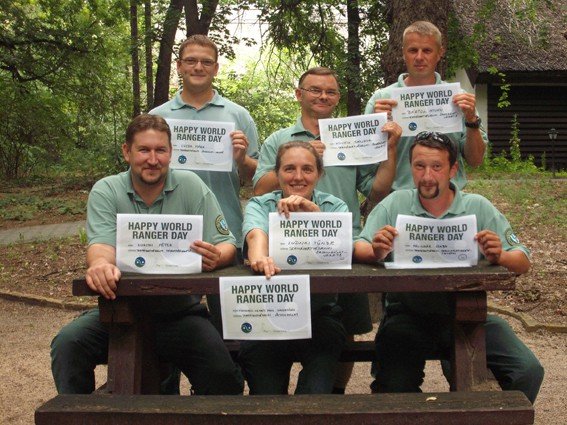 The Ranger Service operates within the organization of the national park directorates and is comprised of rangers of different ranks. Its mission is to protect and safeguard the protected and highly protected natural assets and areas, Natura 2000 sites, archaeological sites and artifacts, as well as to carry out related law enforcement tasks. The national professional guidance and supervision of the Ranger Service is provided by the Ministry of Agriculture's Deputy State Secretary for the Environment.
The Ranger Service operates within the organization of the national park directorates and is comprised of rangers of different ranks. Its mission is to protect and safeguard the protected and highly protected natural assets and areas, Natura 2000 sites, archaeological sites and artifacts, as well as to carry out related law enforcement tasks. The national professional guidance and supervision of the Ranger Service is provided by the Ministry of Agriculture's Deputy State Secretary for the Environment.
The Kiskunság National Park Directorate's Ranger Service oversees an area of nearly 1 million hectares (of which 112 thousand hectares are protected natural areas and 81 thousand hectares are Natura 2000 sites) in Bács-Kiskun County, a large part of Csongrád County, and to a lesser extent in areas of Pest and Szolnok Counties. The 29 park rangers perform their duties in four nature conservation areas and 25 ranger districts. Since December 2017, the work of the teams in the Kiskunság is supported by a poison and carcass searching service dog.

How to identify a ranger
 Rangers are officers who wear a service uniform and have an authorization to carry a weapon, which symbolize their authority to take official measures regarding the protection of the environment through criminal law.
Rangers are officers who wear a service uniform and have an authorization to carry a weapon, which symbolize their authority to take official measures regarding the protection of the environment through criminal law.
Distinguishing marks of their uniform: arm-badges (Coat of Arms of the Ranger Service, employer logo), name, service rank.
The right to act is certified by the service card, and the identification is provided by the numbered service badge.
If nature conservation interests so require, a ranger can go on duty outside normal working hours anywhere within the territory of Hungary. They cooperate with the police, the disaster management, the civil guard, civilian rangers and other law enforcement agencies and municipalities.
Diverse, varied tasks
It is the task of rangers to monitor compliance with all legislation and regulatory requirements for the protection of protected and non-protected natural assets and areas, as well as archaeological heritage. In order to achieve this, they need assure the following:
- monitoring compliance with nature conservation standards;
- halting any person or vehicle endangering or damaging natural and protected natural assets and areas, verifying the ID of said person as well as inspecting the cargo and the vehicle in the event an act of violating nature conservation can be suspected;
- complete monitoring of hunting and fishing activities in protected and heavily protected areas, as well as hunting and fishing involving protected and highly protected species;
- withholding of the means used to endanger natural assets;
- arresting or indicting persons caught in the act of damaging natural assets and resisting retention;
- using coercive measures (physical coercion, handcuffs, police taser, service dog) in the event of resisting the lawful actions of the ranger (the handgun is for self-defense purposes only)
- initiating infringement proceedings, administrative proceedings and criminal proceedings, as well as imposing fines on the spot.
The tasks of the Ranger Service are ever-increasing. There are new challenges to face constantly: illegal landfills, arson, killing protected animals by poisoning, unauthorized picking and sale of protected plants, the use of motorbikes and ATVs in restricted areas, unauthorized logging and wood theft. The protection of the country's nearly 2 million hectares of Natura 2000 sites is also an immense challenge and is required by the European Union.
In addition to those mentioned above, rangers also carry out habitat and species conservation tasks, they participate in the collection of data and information that underpin conservation management, and they also play a role in wildlife management, education, awareness raising and ecotourism.
Let us know!
Should you experience a nature threatening activity, please submit your report to the Board's central email address: titkarsag@knp.hu or call us at: +36 76 482 611.
In the event of a case requiring urgent action (for instance, if you find an injured highly protected animal), call the Ranger Service Hotline: + 36 30 555 6171. On this number, our on-duty colleague answers calls concerning nature conservation, from 8:00 am to 8:00 pm every day. (Please note: other National Park Directorates have different numbers!)
Did you know? Samu, the German Shepherd of the Ranger Service was trained to search for poisons and carcasses in order to curb bird poisoning cases.

Did you know? 31 July is World Ranger Day.



